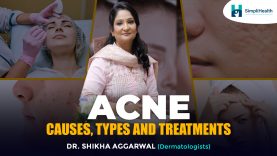Dr. Shikha Aggarwal
Dr. Shikha Aggarwal
Acne: Causes, Treatment, and Tips
Acne can be a person’s worst nightmare. Still, thanks to technology, we now have the upper hand in treating all acne types and even treating hyperpigmentation caused due to acne scarring.
Dr. Shikha Aggarwal has discussed the types of acne causes, types of acne, and treatment.
According to her, oily skin flares up acne also opens pores that appear when it leads to acne. But today, advanced treatments are better than ever.
So the question that crops up is, When does acne occur, and how can it act now?
To answer this question, Dr. Shikha responded by explaining the acne types. Acne can occur at any age, like most of the time, the acne occurs in the adolescent years, called adolescent acne. It often occurs in adults, which is a growing problem these days, which is called adult-onset acne.
She then explained further to give a better picture of the condition and its treatment. The few aggravating factors for the occurrence of acne are according to her, are:
- Acne is way more genetic than environmental.
- A few ingredients in your makeup can block your balls and cause acne.
- Third, a diet consisting of a high glycemic index like white sugars, refined flours can cause a lot of acne on your skin.
- Stress is another factor that makes acne conditions significantly worse.
- And last but not least androgenic genetic steroids, DHEA and many Medicaid medications like this or the injections which you get for the other things can cause acne and acne-like eruptions, which we call acne form eruptions.
She also explained the various types of acne:
Whiteheads
When dried and dead skin cells, oil and bacteria are trapped in the pores, Whiteheads appear. They match the colour of the skin. And sometimes, you need a magnifying lens to see them.
Blackheads
These are thick dark coloured bumps on the skin. Dr. Shikha suggests not to have them removed from the parlours. It is concerning, but it can be treated.
Papules and Pustules
Then the papules form of acne, which is the commonest acne, is the raised bumps on the skin. And the pustules form of acne is the ones which are containing puss.
Cystic
If you have acne or the idea of grade three or grade four, you can have cystic acne.
Nodules
When a severe and deep lesion occurs, it remains in the skin for a more extended time. It is called nodules acne.
Another question that she answered that Dr. Shikha answered was, How can one manage acne?
According to Dr. Shikha, the mainstay of the treatment comes from acne’s medical management. Medical management of acne is the most prevalent treatment in adolescent acne. But your doctor can prescribe you certain antibiotics and topical applications and certain new varieties or face washes to treat acne.
Secondly, suppose the patient is refractory to the treatment of medical management. In that case, the patient’s hormonal profile is to be checked, and all the hormonal status to rule out any PCOS or any other medical condition has to be ruled out.
A chemical peel is the second stage of treatment in acne treatment. There are various chemical peels these days, and solutions are available in the market to treat all acne types.
Explaining the future, she briefed us about the chemical peels.
The three types are:
-Superficial repeat chemical peels
The most common chemical used in the superficial chemical peel is the kojic acid for the lightening of the hypopigmented marks and for giving a fine and a new layer even down to the skin. These superficial peels are very popular these days, and it is a lunchtime procedure. One can always go to your doctor’s to ask about superficial peels and get it done.
-Medium depth chemical peels
These peels, as the name suggests, penetrate a little more deeply. Hence the irregularities lying under the skin surface are effectively managed with these types of medium peels.
-Deep chemical peels
These peels penetrate even deeper. They are more used in patients who have worsened acne, and they have more deep acne scars. But there is a little risk of high post-inflammatory hyperpigmentation with these peels, which is for a grade three and a grade for acne.
Dr. Shikha further briefed us about the alternative and effective treatment, laser treatment. The laser treatment is the more advanced technology that has come up in the last few years to treat acne, though it cannot treat active acne but treats all the acne’s causative agents, i.e. enlarged sebaceous glands, oiliness of the skin. This new technology is very popularly known as ResurFX lasers. Now the size of the sebaceous glands is decreased with these lasers, and more evenly, the acne scarring and little dis-chromium, which have appeared in your skin, can be lessened with these lasers. So if you’re having any of these problems, it can be acne, or it can be hyperpigmentation due to acne, or it could be acne scarring; all have a very definite solution. Dr. Shikha suggests consulting your doctors and get the treatment done. And all of this process may take one to one and a half months. Ask your doctor regarding these treatments’ various modalities and get your acne treated at once.
So now, what can you experience during and after the procedure?
Dr. Shikha stated that one might experience slight itching and a tingling sensation on the treatment area, which means that the treatment has penetrated or the laser light has penetrated your dermis. Scabs or crests rarely appear on the skin. And may after the procedure, you may see that there may be a mild redness on your skin, or there may be slight edema, which goes in two to three hours.







Comments (0)